“This [The Frighteners] launches a new strand, Forgotten TV Drama, run by Network in conjunction with the ‘Forgotten Television Drama in the UK’ project at Royal Holloway, University of London, dedicated to the rediscovery of TV dramas that didn’t make it into television’s narrow and arbitrary canon. It looks like a quixotic venture – but the start could hardly be more promising.”
(Review Sight and Sound September 2017, p. 86)
The Forgotten TV Drama project teamed up with the DVD distributor Network in 2017 to launch a series of releases devoted to some of ‘the innovative and intriguing dramas’, now forgotten, that deserve to be much better-known.
The Frighteners
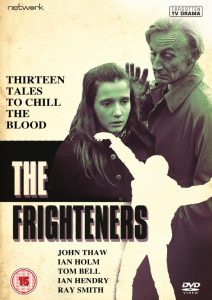 The first release was The Frighteners (1972-3), a particularly neglected series of plays that did not quite conform to the cult TV or horror niche that might have found it a later audience. The series’ title appears to promise nasty stories like Shadows of Fear (Thames, 1970-73), or twists in the tale along the lines of Tales of the Unexpected (Anglia 1979-88).
The first release was The Frighteners (1972-3), a particularly neglected series of plays that did not quite conform to the cult TV or horror niche that might have found it a later audience. The series’ title appears to promise nasty stories like Shadows of Fear (Thames, 1970-73), or twists in the tale along the lines of Tales of the Unexpected (Anglia 1979-88).
However, while the plays that make up The Frighteners use devices associated with horror, they also demonstrate clear affinities with Armchair Cinema (Thames, 1974-75) and tell stories, rooted in contemporary concerns such as mental illness, surveillance, the after-effects of colonialism and National Service, in which ‘ordinary people’ are threatened by situations that have spun out of control.
Highlights include ‘The Manipulators’ written and directed by Mike Hodges a year after Get Carter, and Andrea Newman’s first original TV screenplay, ‘Night of the Stag’. The two-disc release is accompanied by a specially-written booklet by Billy Smart.
The Crunch
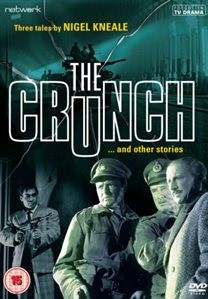 The second Forgotten Television Drama release – ‘The Crunch … and other stories’ – consists of three plays by the writer Nigel Kneale, best-known for his pioneering Quatermass stories and adaptation of 1984.
The second Forgotten Television Drama release – ‘The Crunch … and other stories’ – consists of three plays by the writer Nigel Kneale, best-known for his pioneering Quatermass stories and adaptation of 1984.
The Crunch (ATV 1964) is about an attempt to avert a nuclear catastrophe in London, written for ITV’s Studio ’64 series; Ladies’ Night (Central 1986) is a chilling story of misogyny involving members of a gentlemen’s club who turn on a woman after she ridicules them; and Gentry (Central 1988) is a suspense drama featuring Roger Daltrey as an East End villain.
Billy Smart has written viewing notes for the three plays and director Roy Battersby – who was involved in Forgotten Television Drama screenings at Manchester in 2017 – has written an introduction to Gentry.
The Nearly Man
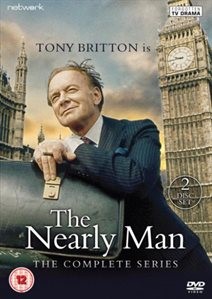 Arthur Hopcraft’s The Nearly Man (1974-75), is a Granada series about a Labour MP (Tony Britton) who has an uneasy relationship with his northern working-class constituency and faces the prospect of de-selection.
Arthur Hopcraft’s The Nearly Man (1974-75), is a Granada series about a Labour MP (Tony Britton) who has an uneasy relationship with his northern working-class constituency and faces the prospect of de-selection.
The two-disc DVD release includes the 1974 single play (previously shown as part of the season of the ‘Forgotten Dramas’ season at BFI Southbank in 2017), along with the subsequent seven-part series which followed in 1975.
John Hill has written viewing notes, which include an extract from an interview with John Irvin (conducted at ‘The Forgotten, the Lost and the Neglected’ conference in 2015), who directed the original play and four episodes of the series.
“A fractious referendum concerning the UK’s relationship with Europe; the country in dire economic straits; members of the Labour Party seeking covertly to deselect MPs for lack of commitment to socialist causes; shady lobbying groups approach MPs to advise on the likely direction of government policy…. These are some of the incidents that characterize the 1975 Granada series The Nearly Man and which suggest that its release on DVD and the chance to revisit it comes at an apposite moment. The release and indeed retrieval is thanks to the AHRC-funded research project The History of Forgotten Televison Drama in the UK…”
(Review, Viewfinder, No. 110, April 2018)
For Maddie With Love
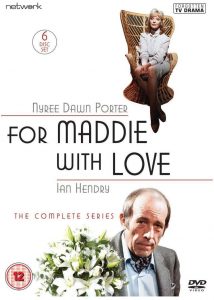 For Maddie With Love (ATV 1980) is the story of a woman who knows she is dying and, in doing so, rediscovers the love she has for her husband and family.
For Maddie With Love (ATV 1980) is the story of a woman who knows she is dying and, in doing so, rediscovers the love she has for her husband and family.
Responsible for memorable performances from Nyree Dawn Porter and Ian Hendry and taking advantage of an affecting, stylishly minimalist design ethic, this daytime afternoon drama – which ran twice-weekly through much of 1980 – became compelling viewing due to its powerful take on terminal illness, euthanasia and the aftermath of a death in the family.
The set contains all 48 episodes of this series and is accompanied by a Forgotten TV Drama booklet written by Billy Smart.
Armchair Theatre Archive
“The discs are another fruit of Network’s partnership with ‘Forgotten Television Drama in the UK’ project at Royal Holloway, University of London, and a good part of the enjoyment comes from the thorough and thoughtful introductions to each play by the academics Lez Cooke, John Hill and Billy Smart. It’s a brilliantly enlightened enterprise; I hope there’s plenty more to come.”
(Review of Armchair Theatre Archive, Sight and Sound, October 2019, p. 86)
As part of the Forgotten TV Drama releases, a series of Armchair Theatre Archive has also been launched. Armchair Theatre began on ITV in July 1956 and is generally credited with changing the look and style of television drama in terms of both writing and methods of production. It is also celebrated for its encouragement of new forms of contemporary socially-conscious drama at the end of the 1950s and the beginnings of the 1960s.
Armchair Theatre Archive sets out to demonstrate the range, quality and interest of the dramas that were produced and introduce some of the less well-known plays that made up the weekly diet of Armchair Theatre.
Viewing notes for all four volumes are provided by the series curators Lez Cooke, John Hill and Billy Smart.
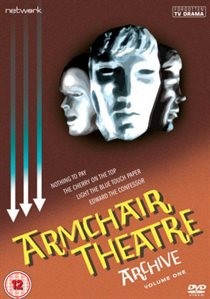 Volume One contains four plays from 1962-69. Welsh writer Alun Richards’ Nothing to Pay (1962), set on the day of a rugby international between England and Wales, follows the attempts of a Welsh businessman Louis Shell (Clifford Evans) and his nephew Lydiat (Kenneth Griffith) to break up the relationship between Louis’ daughter Eleanor (Daphne Slater) and a man whom they consider to be an opportunist. Directed by Armchair Theatre regular Charles Jarrott, ‘the expert in emotional drama among A.B.C’s directors’, the play vividly teases out the high cost for all concerned.
Volume One contains four plays from 1962-69. Welsh writer Alun Richards’ Nothing to Pay (1962), set on the day of a rugby international between England and Wales, follows the attempts of a Welsh businessman Louis Shell (Clifford Evans) and his nephew Lydiat (Kenneth Griffith) to break up the relationship between Louis’ daughter Eleanor (Daphne Slater) and a man whom they consider to be an opportunist. Directed by Armchair Theatre regular Charles Jarrott, ‘the expert in emotional drama among A.B.C’s directors’, the play vividly teases out the high cost for all concerned.
The Cherry on the Top, the opening play of Armchair Theatre’s Autumn 1964 season, is a good example of producer Leonard White’s intention to regularly include comic plays in the series repertory alongside more serious and demanding material. The play was written by Armchair Theatre’s most prolific author, Donald Churchill, and features Robert Lang and Pauline Yates in a convincing romantic comedy.
John Hale’s Light the Blue Touch Paper (1966) saw Armchair Theatre moving into more ‘political’ territory with Ronald Hines and Anna Massey starring in a play dealing with chemical warfare. Leigh Vance’s Edward the Confessor (1969), on the other hand, is a black comedy in which its story of a frustrated ‘little man’ (Ian Holm), his widowed landlady (Beryl Reid) and unsettling interloper (Alfred Burke) knits together elements of both Joe Orton and Harold Pinter.
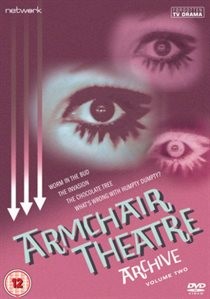 Volume Two contains four plays made between 1959 and 1967. Restored as part of the Forgotten Television Drama project, and shown in Belfast for the first time in 2017, John D. Stewart’s Worm in the Bud is the oldest surviving television drama by a Northern Ireland writer. Produced in the studio in England using members of the Ulster Group Theatre that included Elizabeth Begley and Joseph Tomelty, the play tells the story of the suspicions aroused amongst the neighbours of an elderly man living on his own in Belfast.
Volume Two contains four plays made between 1959 and 1967. Restored as part of the Forgotten Television Drama project, and shown in Belfast for the first time in 2017, John D. Stewart’s Worm in the Bud is the oldest surviving television drama by a Northern Ireland writer. Produced in the studio in England using members of the Ulster Group Theatre that included Elizabeth Begley and Joseph Tomelty, the play tells the story of the suspicions aroused amongst the neighbours of an elderly man living on his own in Belfast.
Angus Wilson’s sci-fi oddity The Invasion (1963), featuring Patrick Wymark, Frances Rowe, Athene Seyler and Eleanor Summerfield, is a highly ambitious work that combines a social-satirical story undercut with an outlandish tale of Martian invasion, in which the human characters are so wrapped up in their own concerns that they are oblivious to the invasion happening around them.
Andrew Sinclair’s satire on racial politics The Chocolate Tree (1963) features a fine performance from Earl Cameron as the leader of a newly-independent African state involved in a confrontation with an English trading family immersed in a colonial mindset.
Hugh Whitemore’s ‘swinging sixties’ satire What’s Wrong with Humpty Dumpty? (1967), features Donald Houston as a self-important director of ‘social-realist’ documentaries who is having an affair with a naïve shop assistant played by Lynn Redgrave.
Viewing notes are provided by the series curators Lez Cooke, John Hill and Billy Smart along with Stephen Bourne who has contributed notes on The Chocolate Tree.
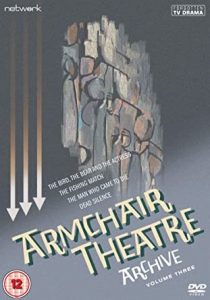 Volume Three presents four plays produced from 1959 to 1966. John Glennon’s The Bird, The Bear and the Actress (1959), directed by Ted Kotcheff, is about a chance meeting on the French Riviera of three New Yorkers – the Broadway producer P. Panghurst Shippers (Harry H. Corbett), theatre director Harris Glass (Lee Montague) and his actress wife Gertrude Glass (Kate Reid) – with the reclusive octogenarian English theatre designer ‘T.G.B’ (Barry Jones), whose character is a barely-disguised version of the visionary theatre designer Edward Gordon Craig.
Volume Three presents four plays produced from 1959 to 1966. John Glennon’s The Bird, The Bear and the Actress (1959), directed by Ted Kotcheff, is about a chance meeting on the French Riviera of three New Yorkers – the Broadway producer P. Panghurst Shippers (Harry H. Corbett), theatre director Harris Glass (Lee Montague) and his actress wife Gertrude Glass (Kate Reid) – with the reclusive octogenarian English theatre designer ‘T.G.B’ (Barry Jones), whose character is a barely-disguised version of the visionary theatre designer Edward Gordon Craig.
The second play in the collection, Norman King’s The Fishing Match (1962), conforms more to the regional ethos of Armchair Theatre in its early days. Directed by Alan Cooke this comedy drama is set in a riverside pub in the English Midlands and features Kenneth Griffith, Peter Butterworth, Edward Evans and Colin Campbell as a group of fishermen who, on arriving at the pub, are met by the forceful landlady, played by Yootha Joyce. The play includes the earliest surviving performance of Derek Jacobi as a loud-mouthed layabout and bully, a role Sir Derek has rarely played since.
The Man Who Came to Die (1965) is a murder mystery written by its leading actor, Reginald Marsh. Marsh described the play as a ‘comedy whodunnit’, suggesting an amalgamation of the comedy of The Man Who Came to Dinner (1947), in which he made his first television appearance, and the murder mystery genre in which he frequently appeared on stage and screen. Much of the humour in the play arises from the performance of the housekeeper, played by Gretchen Franklin, whose career on stage and screen spanned a remarkable 80 years. Franklin had been appearing in television plays since 1948 and this was her fifth Armchair Theatre play, although she is best known for her long-running role as Ethel Skinner in EastEnders.
The final play in Volume Three is Dead Silence (1966), a well-crafted ‘whodunnit’ by the South African writer Monte Doyle involving a police investigation into the murder of an attractive young woman (played by Joanne Dainton) living alone in a luxury block of flats. The chisel-jawed film and television actor Patrick Allen plays the role of Detective Chief-Inspector Newton with a convincing sense of the moral ambivalence that the plot requires. The play was directed by the seasoned film and television director John Moxey who possessed a particular affinity for the thriller and horror film and brought a degree of visual sophistication to the play.
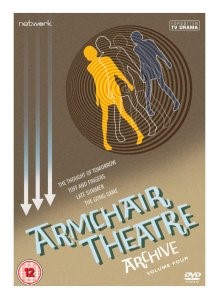 Volume Four in the series also presents four plays spanning the years 1959 to the mid-1960s. James Brabazon’s The Thought of Tomorrow (1959) features Rupert Davies as the Sales Director of a cloth manufacturing company, whose health is suffering from the relentless pressure to achieve results in a competitive market. Directed by Alan Cooke, the play is about the ‘rat race’ – the ruthlessness of business and the price that must be paid for achieving success.
Volume Four in the series also presents four plays spanning the years 1959 to the mid-1960s. James Brabazon’s The Thought of Tomorrow (1959) features Rupert Davies as the Sales Director of a cloth manufacturing company, whose health is suffering from the relentless pressure to achieve results in a competitive market. Directed by Alan Cooke, the play is about the ‘rat race’ – the ruthlessness of business and the price that must be paid for achieving success.
Robert Kemp’s Toff and Fingers (1960), features Roger Livesey and Harold Goodwin as the eponymous ‘Toff’ and ‘Fingers’, two robbers from London hiding up in a Scottish Highlands hotel. They pass themselves off to the locals as a gentleman and his valet, becoming beguiled by the way of life they discover in the village of Auchenlochan.
Alexander Baron’s Late Summer (1963) is about the stressful relationship between a middle-aged woman (Constance Cummings) and a much younger man (John Stride), set in a sparsely attended hotel in the South of France. Directed by Reginald Collin, the play has an elaborate multi-layered set by the prolific Armchair Theatre designer Voytek, providing an elegant environment in which the drama between the two central characters is played out. In his viewing notes Billy Smart describes Cummings’ ‘display of repressed and released emotion in the play’s final scene’ as ‘a master class of close-up television acting’.
Michael Harald wrote The Gong Game (1965), the final play on Volume Four, especially for Leslie Phillips, whose career up to this point had largely been defined by his roles as a suave charmer in the Carry On and Doctor films and in the BBC radio sitcom, The Navy Lark. The Gong Game is no comedy, however, but a poignant story about an ex-RAF war hero, now down on his luck, who faces a prison sentence for stealing some money to pay his daughter’s school fees. Like the other plays on these volumes, The Gong Game shows that Armchair Theatre was far more diverse, generically and regionally, than its reputation for producing Northern ‘kitchen-sink’ drama, such as No Trams to Lime Street (1959) and Lena, O My Lena (1960), may suggest.
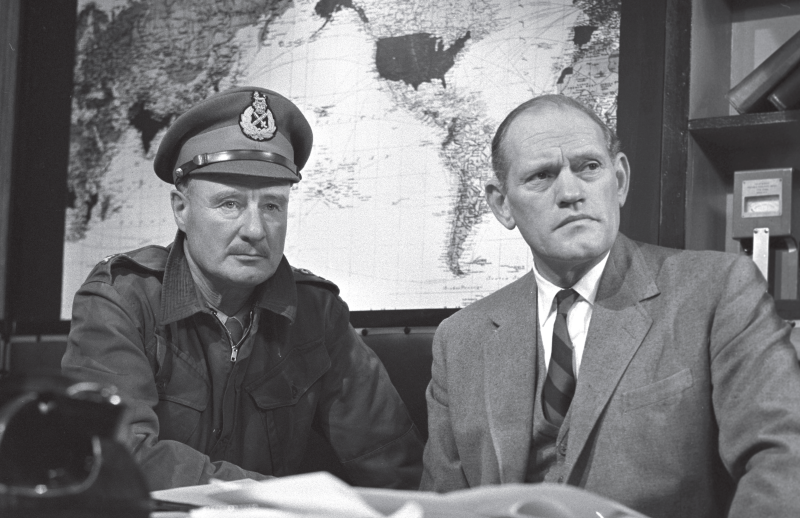
The Crunch
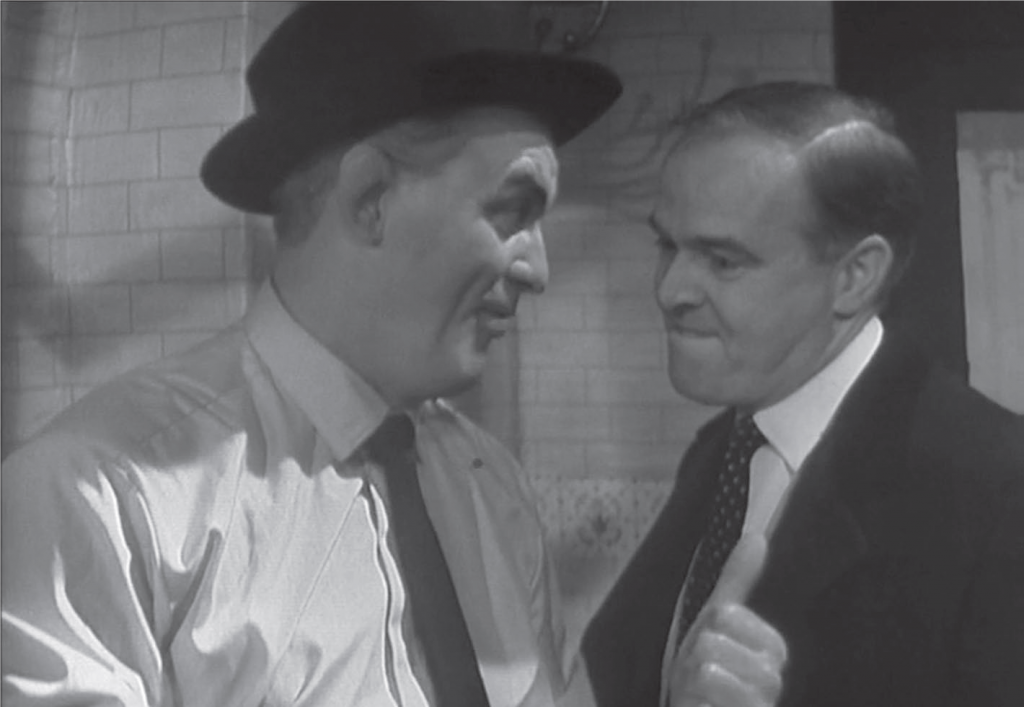
Nothing to Pay